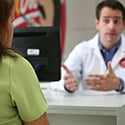
New Patient Consult Tips for Associates
First and foremost, you need to find additional training to fill in some of the gaps you did not learn in dental school. From my training with The Dawson Academy, I realized the importance of having meaningful and organic patient consults.
The whole new patient experience changed for me.
From there I was learning how to treatment plan based on what the patient was telling me during that consult. The patient and I discuss types of treatment and amount of treatment. I think consults were one of the things that I struggled with at that time. When I was starting to implement some of the Dawson philosophy and understanding how to treat patients this way, I really struggled with consults, and I think a lot of people do.
Connect with the patient, don’t just talk about treatment.
A lot of our teachers and our mentors have been doing this for 30-plus years, and they’re really successful at consults. It’s easier for them to go in there with confidence that their options are the best and that their experience makes it easier for them to treatment plan on the fly when the patient changes the direction. I remember struggling with this, trying to do the same things that they were doing, and I had such a hard time going in there and talking ideal treatments but then still connecting with the patient. It has to be both!
Do you want to be a butcher or a dietitian?
If you went to a butcher and you said, “What should I eat for dinner today?” then he’s probably going to tell you meat because he sells meat. Versus if you went to a dietitian and you said, “What should I eat tonight?” the answer would be pretty different. They would be asking a lot of questions about your health habits, offering different options and trying to find that perfect, balanced meal for you.
Our job is to educate and provide options.
As soon as I heard that analogy, it just clicked for me that my job is not to make sure they’re always choosing what I think is the perfect treatment, without considering what they want. My job is to educate the patients on what is going on in their mouth. My job is to always be at the top of my game from an education standpoint so that I know the different options. This is crucial because if I know how I can phase them through it and get this done over the period years, I can make it financially affordable for them. My job is to help them make the best decision for them and for their family.
Your initial treatment plan is not set in a stone, make it a ‘working consult’.
Once I made that switch from butcher to dietitian, the consults became almost effortless, and I started to enjoy them. I had the mindset of going in there and just truly feeling like I’m helping somebody. I call it a working consult because I can be in there with a treatment plan, and we’ll move things around. Typically, when the patient leaves, we at least have a direction, and I really feel like we’re on the right track to helping them.
You have done the hard work to learn this, now focus on building trust.
 You just need to focus on building that trust and getting on their side of the table to find the best option for them. I just started asking questions and being curious about what they were thinking. I think the worst thing you can do is tell a patient a big solution or treatment plan when they’re not ready to hear it. This an important concept I think a lot of new grads miss, because that builds their trust.
You just need to focus on building that trust and getting on their side of the table to find the best option for them. I just started asking questions and being curious about what they were thinking. I think the worst thing you can do is tell a patient a big solution or treatment plan when they’re not ready to hear it. This an important concept I think a lot of new grads miss, because that builds their trust.
I want them to know that I am just listening, and I want to help them with where they are now. It doesn’t mean it’s right or wrong. It’s not right or wrong to choose different options or not choose the most ideal option. But I think that has played a big part in it because then it just really does feel like a conversation because that’s what we’re doing. It’s not me telling them what to do, we’re having a conversation about, “Yes. You understand it. You understand the compromise if you don’t go forward with maybe the most ideal, but we’re still going to help you.” You need to show them that you are on their side.
Gain confidence to provide excellent treatment in our hands-on course, Treatment Planning – Functional Esthetic Excellence.










Leave a Reply
Want to join the discussion?Feel free to contribute!